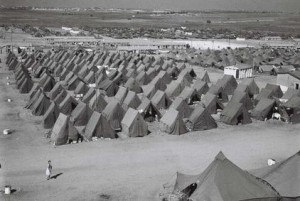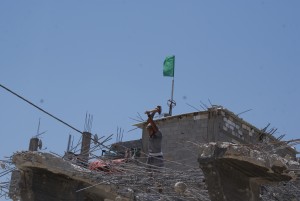Refuge in exile for Palestinians and Israelis
By Khaled Diab
Is it possible for Israelis and Palestinians to find common refuge in their shared notions of exile and return?
Thursday 23 August 2012

The United States House of Representatives is now considering a bipartisan bill, submitted last month, that would effectively equate the plight of Palestinian refugees with that of Jews whose origins were in Middle Eastern countries.
Although the tragedy that befell Jews in Arab countries following the creation of Israel certainly requires recognition and redress, many Mizrahi Jews resent the linkage.
“The basis of this equivalence is spurious. Arab Jews and Palestinians have two different histories and their experiences are not similar,” insists David Shasha, who directs the Center for Sephardic Heritage in Brooklyn. “Israel has maintained that Arab Jews are members of the Jewish nation and are part of Israel. The fact that they were or were not expelled from Arab countries should not then be relevant to any peace negotiations.”
Peace activists see in this latest initiative a transparent political ploy to undermine the claims of Palestinian refugees. Noting that congress has never proposed such a bill for Palestinian refugees, Lara Friedman of Americans for Peace Now points to a similar Israeli foreign ministry initiative whose “focus is not only (or even primarily) seeking justice for Jews from Arab countries. The main goal is to impose new terms of reference on future peace negotiations.”
Despite this manipulation of the tragedy of the Middle East's ancient Jewish populations, there are clear parallels between that calamity and the one that befell the Palestinians. In fact, you could say that Arab Jews are the Middle East's “other Palestinians”.
“Both Palestinians and Jews from Arab lands were at the mercy of competing nationalisms – Zionism and Arab nationalism – sweeping the region at the time, playing off each other and insisting on reductive definitions of identity,” observes journalist and writer Rachel Shabi, herself of Iraqi Jewish descent, who is the author of Not The Enemy, a book on the history of Israel's Mizrahi Jews.
Recalling how well-integrated into the fabric of Iraqi society and relatively successful Jews were, the prominent Iraqi-Israeli poet, academic and translator of Arabic literature Sasson Somekh told me how in light of World War II, and the fascism it unleashed, and the conflict in Palestine: “Everything changed forever. In 1948, I was 15 and I recall how people would curse Jews and throw stones at them.”
By 1951, the situation for Iraqi Jews had become so untenable that most agreed reluctantly to give up their citizenship and property in return for safe passage out of Iraq. By the 1970s, the Middle East's rich Jewish heritage had all but disappeared, though fairly sizeable Jewish communities continued to exist in Iran and Morocco.
Although Palestinians and Arab Jews do have the loss of their homelands in common, the Mizrahim, particularly those in Israel, generally do not wish to return to their ancestral lands – indeed, many Mizrahim are actually situated on the anti-Arab end of the Israeli political spectrum. Some do visit their places of origin, such as Jews of Yemenite descent (who are the only Israelis allowed to travel to that country), as well as Moroccan and Egyptian Jews, but it should be recalled that Israeli Jews from most Arab countries are not allowed to visit their ancestral lands.
The majority of Mizrahi Jews today appear to be ideologically committed to the idea of Israel as their homeland. This is reflected, for example, in the fact that the Mizrahi vote brought the settler-friendly Likud to power in 1977 and has acted as a core power base for the party ever since. This implies that most Mizrahim no longer qualify as refugees, though they once were.
However, there are some, albeit a minority, who do still regard themselves as refugees and dream of unlikely return. Take Mati Shemoelof, a second-generation Iraqi-Israeli poet, journalist and activist who defines himself as “Arab” and believes that Mizrahi Jews went “from exile to exile.”
He wants Iraq, which he wishes to visit “more than anything in the world,” to make up for its historic crime by granting Iraqi Jews the right of return and full citizenship, while allowing them to retain their Israeli nationality and identity. His vision: “I want to live in two worlds.”
Shemoelof's sentiments echo those of many Palestinians. Not only do many of them dwell in perpetual limbo in refugee camps across the Middle East, but the experience of exile and dream of improbable return is a central pillar of Palestinian identity. In his evocative memoirs of exile and return, I Saw Ramallah, the Palestinian poet Mourid Barghouti, who was stranded in exile due to the outbreak of the 1967 war, reflected upon his return how Israel “took from us the land of the poem and left us with the poem of the land” and that the “long occupation has succeeded in changing us from children of Palestine to children of the idea of Palestine”.
“[Exile is] a feeling that I have to carry my roots with me, so to speak, but can never fully put them down anywhere,” describes Jennifer Jajeh, a Palestinian-American actress.
Many in the diaspora feel that both they and their homeland have become phantoms. “I feel like I'm a visitor to my own home, like a ghost walking around in a land where other people refuse to see us even when we're talking with them,” says Ray Hanania, a prominent Palestinian-American columnist, broadcaster and comedian from Chicago who visits Israel and Palestine regularly.
Those who cannot live in or visit the old country dream of being allowed at least to make it their final resting place. “When we die, bury us in Palestine. If you can't manage that, then try to bring some of its soil and bury it with us,” the parents of a Jordanian-Palestinian friend used to tell her.
And this sense of exile can be just as acute among the Palestinians who stayed behind, as they watch the land of their forefathers morph into another country. For instance, one young Palestinian I know from a village near Bethlehem lives frustratingly within eyeshot – across a railway line which became part of the Green Line – of what was once his family's farmland but became part of Israel.
“When I go to Jerusalem and walk around certain parts of it, I don't feel that I belong to that place, because it has been colonised,” says Hurriyah Ziada, a 22-year-old Palestinian student and activist in Ramallah.
Living within the boundaries of her historic homeland does not blunt Ziada's keen sense of being an exile and refugee, perhaps partly because the movement restrictions imposed by Israel mean she has not been able even to visit her ancestral village of Faluja, near Gaza but now part of the Israeli town of Kiryat Gat. In 1948, Faluja's residents had refused to flee the fighting but were subsequently driven out following the 1949 armistice.
Echoing the early Zionists, Ziada dreams of making Faluja her home – even though the town does not exist anymore and the surrounding area has become completely Israeli – and living the life of a Palestinian pioneer there. “It's true that I'm used to living here [Ramallah] and all that, but it is my right to return to the village,” she insists, noting that “I'm willing to pay the price, and to start from scratch because this is the only way.”
It is unclear how representative Ziada's views are of Palestinian refugees in general, since little research has been carried out on the taboo question of actual versus symbolic return and recognition of the historic wrong committed against the Palestinian people.
For most Israelis, even peace activists and pacifists, the idea of Palestinian return to what is today Israel is a complete non-starter. The creation and development of Israel “entails an essential injustice to the Palestinian people,” Amos Oz, one of Israel's leading novelists, told me during a long and riveting conversation in his basement study.
In Oz's view, it is essential for Israel to maintain “a Jewish majority” – though he diverges from the mainstream in his belief that Israel should be a state for all its citizens – even if it means shrinking its territory. His reasoning? That Jews have a right to live free of persecution and to determine their own destiny.
Palestinian return, in his view, should be to a Palestinian state within the full pre-1967 borders, referring to the armistice lines before the 1967 Six Day War. He argues that this is the pragmatic and realistic thing to do. But for an influential segment of Palestinian society, the idea of refugees not having the right to return to anywhere other than the actual homes and towns they abandoned is anathema.
So what's the solution? According to some, compromise on both sides is the only way to ensure “a means of both of us surviving”, as Ray Hanania puts it.
—
Follow Khaled Diab on Twitter.
This is the extended version of an article which first appeared in Haaretz on 20 August 2012.


